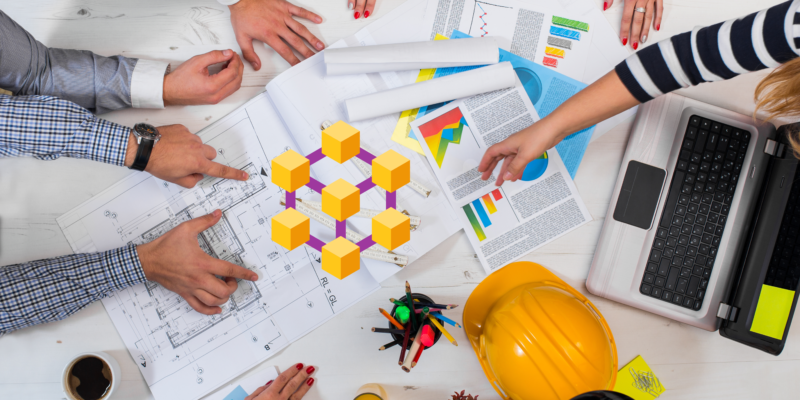Technology has permeated almost every facet of our lives, transforming industries and revolutionizing processes. You know that we’re always on the lookout for new construction technology, which is how blockchain caught our attention.
What is a blockchain?
Originally developed for cryptocurrencies like Bitcoin, a blockchain is a distributed and decentralized digital ledger that records transactions across multiple computers. Information on a blockchain is stored in blocks, linked together in chronological order, creating an immutable and transparent chain of records. It’s known for its security, transparency, and tamper-resistant nature, which makes it perfect for use in construction.
What does it have to do with construction?
Our industry is known for its complex web of stakeholders, intricate supply chains, and numerous documentation processes. These complexities often lead to challenges like miscommunication, delays, disputes, and sometimes even fraud. Traditional record-keeping methods, involving paper documents and multiple individuals, can make these issues worse. Fortunately, blockchain is here to solve many of those problems.
Supply Chain Management
Blockchain solutions can provide end-to-end visibility in the supply chain by recording every step of a material’s journey. This helps prevent counterfeit materials, ensures quality control, and reduces delays caused by supply chain bottlenecks.
Smart Contracts
Smart contracts are self-executing contracts with terms directly written into code. They can automate processes like payments, work milestones, and penalty enforcement. This not only reduces administrative overhead but also eliminates potential disputes arising from misinterpretation.
Document Management
Important construction documents such as permits, licenses, plans, and contracts can be securely stored on a blockchain. This prevents tampering and unauthorized access while ensuring all parties have access to the most current information.
Project Tracking
Blockchains can provide real-time updates on project progress, allowing stakeholders to monitor milestones, changes, and delays. This transparency fosters trust among collaborators and minimizes misunderstandings.
Financial Transactions
Blockchains can facilitate secure and efficient payment processing, ensuring that contractors, subcontractors, and suppliers receive their dues promptly. This is particularly important in an industry where cash flow challenges are common.
Maintenance and Warranty Tracking
Long after a construction project is completed, blockchains can track maintenance schedules, warranties, and repairs. This simplifies management and ensures accountability throughout the life of the building or site.
Other Benefits
Blockchain’s transparent and tamper-proof nature ensures that everyone involved has access to accurate information, reducing disputes and fostering trust and transparency. It also leaves a clear audit trail, making it easier to hold the right people accountable if there is a discrepancy.
Its automation through smart contracts streamlines processes, reducing paperwork and administrative tasks, and the decentralized and encrypted nature of blockchain safeguards sensitive data from unauthorized access and cyber threats. Best of all, by eliminating intermediaries and reducing delays, blockchain can lead to significant cost savings, making everybody happy.
Blockchain Challenges
While the potential benefits of integrating blockchain solutions into the construction industry are substantial, challenges remain. Adoption requires a significant shift in mindset and operational processes, and to reach its full potential all platforms across a project must be standardized (which often involves several different parties). It will take some time, but we expect to see blockchain technology redefining the construction industry by addressing long standing challenges with innovative solutions.
By enhancing transparency, efficiency, and accountability, blockchain is paving the way for a more streamlined, collaborative, and trustworthy construction ecosystem. As the technology continues to mature and gain acceptance, we can anticipate a construction landscape that’s not only built on concrete and steel, but also on secure and transparent digital foundations.

